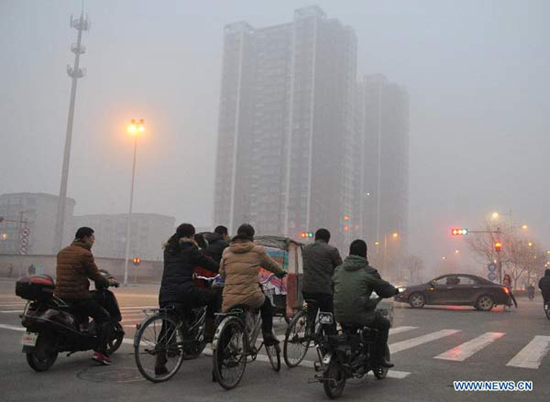
 |
| Citizens wait to cross the road at an intersection in Shijiazhuang, capital of north China's Hebei Province, Feb. 16, 2013. [Xinhua] |
A proposed law amendment aims at controlling the level of atmospheric pollution in major urban areas, and has the support of the general public.
The third amendment to the prevention and control of atmospheric pollution needs to accelerate and add provisions such as measures on air pollution emergency incidents, regional joint prevention and control mechanism and fuel quality control, experts say.
The Chinese "Clean Air Act" was first put into effect in 1987, and its most recent edition was adopted in 2000. A newly revised draft copy was submitted by the Ministry of Environmental Protection (MEP) to the Legislative Affairs Office of the State Council in January 2010, but a copy has not yet been submitted to the National People's Congress, the Economic Observer reported.
Excessive air pollution during the Spring Festival holiday generated public outcry and many citizens are urging the government to adopt the new legislation.
Figures released on February 17 by the MEP show that 42.7 percent of 74 surveyed Chinese cities reported higher-than-normal PM2.5 reading. The highest average reading in a single day was 426 micrograms per cubic meter, or 5.7 times the country's standard of 75 micrograms, Xinhua News Agency cited.
"These rare, high-intensive, large-scale and long-lasting heavy pollution incidents lead to introspections over air pollution prevention and control efforts, and the economic and social development status in China, stimulating deeper discussions on amending air pollution laws," said Chai Fahe, deputy head of the Chinese Research Academy of Environmental Sciences, in an exclusive interview with CnDG.

















 Attractive boys and girls at an art college's enrollment site in Qingdao
Attractive boys and girls at an art college's enrollment site in Qingdao


![]()
